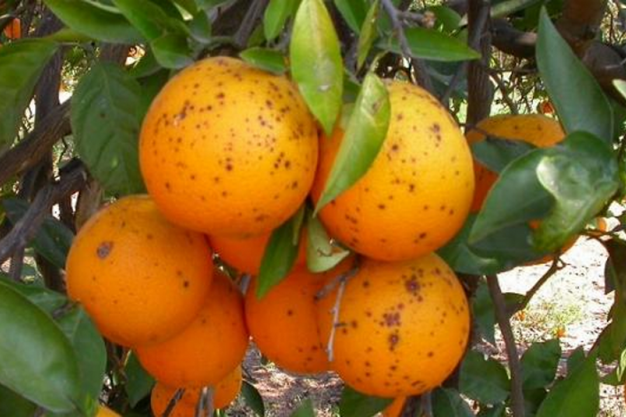The EU continues to intercept citrus fruit imports with quarantine pests or diseases. In August, it rejected 26 shipments in total, according to data compiled by La Unió.
La Unió urgently demands cold treatment for citrus from those countries that cannot guarantee the sanitary safety of their shipments, as it's the only way to stop the possible entry of a quarantine pest.

Black spot on citrus
It's worth highlighting that the shipments intercepted in August included, once again, the presence of several cases of false moth(Thaumatotibia leucotreta), black spot (Phyllosticta citricarpa), citrus canker (Xanthomonas), and citrus scab (Elsinoë), all of which are lethal pests that are not present in European citrus growing. This means some countries still do not offer the necessary health guarantees for their shipments.
According to La Unió, there should be more inspections, more controls carried out at source, and cold treatment should be adopted for all those countries that are unable to guarantee the sanitary safety of their shipments, such as Turkey, Egypt, South Africa, Zimbabwe, Botswana, Swaziland, and some South American countries such as Argentina, Brazil, Uruguay, and Colombia.
In addition, this continuous trickle of interceptions of quarantine pests and diseases is taking place in a context where citrus producers suffer a significant cost overrun to combat recently introduced pests. La Unió's calculations indicate that the last six pests that have entered Spain in the previous fifteen years have increased production costs by 40% and destabilized how agronomic management is carried forcing the sector to update integrated production and pest control plans constantly. The latest two pests to enter the territory, the Euophrys banksi arachnid and the South African thrips, have already been detected in citrus, persimmon, and pomegranate crops in the Valencian Community, and their effects are already noticeable.
"We have to fight many pests with increasingly fewer means of control. To make things worse, we also have to fight new pests such as the latest South African thrips or any other pests that might enter our territory. The European Union must take this situation very seriously and adopt urgent measures such as cold treatment," stated Carles Peris, general secretary of La Unió Llauradora.
In addition to the pest issues, there is a lack of reciprocity in phytosanitary matters. "We must ban the entry of all import products that do not comply with the commitments of the European Green Pact's phytosanitary strategy. We have to compete on equal terms, not like we've done so far. We can't promote imports while our citrus fruits sometimes rot on the trees," Peris stated.
For more information:
Carles Peris
La Unió
Tel.: +34 963 530 036
Email: launio@launio.org
https://launio.org
